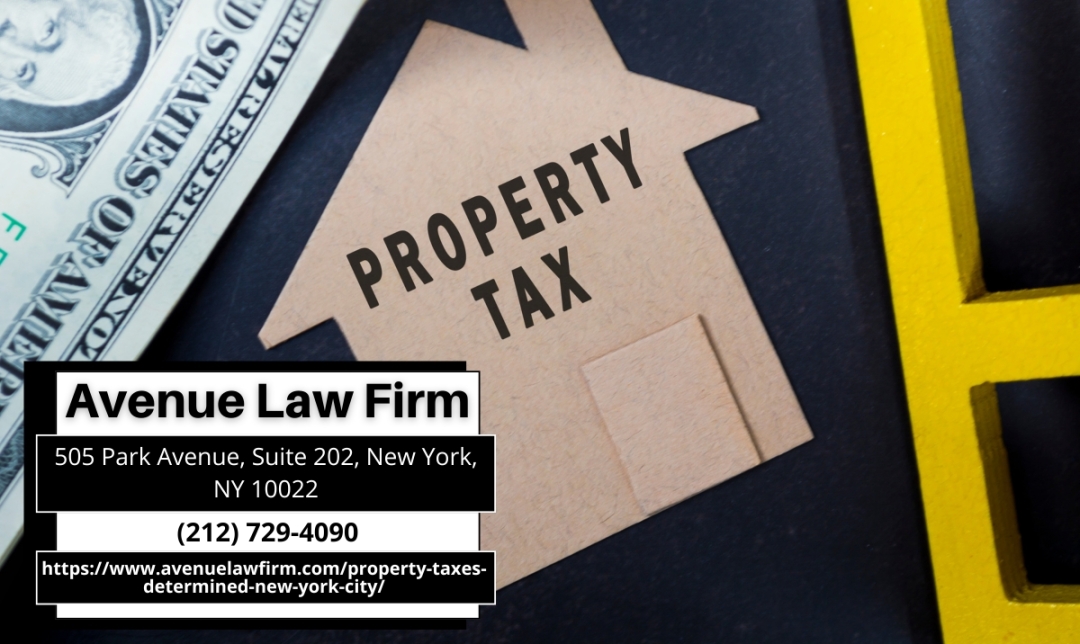New York City property taxes are a significant revenue source for the city, contributing around 45% of its annual tax collections. In his recent article titled "How are Property Taxes Determined in New York City," Peter Zinkovetsky (https://www.avenuelawfirm.com/property-taxes-determined-new-york-city/), an NYC real estate lawyer from Avenue Law Firm, provides insight into how the city calculates property tax bills and whether homeowners can reduce their tax liabilities.
According to Zinkovetsky, understanding the structure of property classifications is crucial for property owners and investors in New York City. NYC properties fall into four classes: Class 1 for one- to three-unit residential homes, Class 2 for larger residential buildings like co-ops and condominiums, Class 3 for utilities, and Class 4 for commercial properties. Zinkovetsky, a knowledgeable NYC Real Estate Lawyer, highlights that Class 1 residential properties, which include many family homes, are subject to specific assessment methods to determine tax rates.
An NYC real estate lawyer can clarify the steps the city takes to calculate property taxes. The first step is determining a property's market value, often using sales data from comparable homes in the same area. Next, the government calculates the assessed value, which is capped to prevent sudden spikes. For Class 1 properties, the assessed value cannot rise by more than 6% in a year or 20% over five years.
Zinkovetsky explains, “Because of these caps, it is possible that the assessed value of the property continues to increase even if the market value decreases.” This mismatch can happen when market values drop, but the assessed value continues catching up from prior years' increases.
In addition to understanding property classifications and assessments, Zinkovetsky outlines the role of exemptions in lowering property tax bills. The city offers exemptions for seniors, veterans, and other qualifying homeowners. For example, the STAR exemption, available to homeowners earning less than $500,000 annually, can reduce assessed values, potentially saving hundreds of dollars per year.
Exemptions can provide substantial financial relief, but Zinkovetsky warns that homeowners should stay informed about eligibility requirements. Some exemptions, like those for senior citizens and persons with disabilities, come with specific income thresholds and application deadlines. He recommends consulting with local tax assessors to understand the exemptions available and their potential impact on tax bills.
The article also touches on property tax abatements, which offer additional savings for homeowners making specific property improvements. Examples include green roof abatements, solar energy installations, and cooperative or condominium abatements. These abatements incentivize energy efficiency and sustainability while reducing tax liabilities.
Zinkovetsky emphasizes that navigating New York City's property tax system can be challenging due to its evolving nature and the various factors that influence tax bills. He notes that property owners must remain aware of changes to assessments and exemptions to maximize savings. For many, engaging an NYC real estate lawyer can provide clarity and assistance in identifying discrepancies or appealing unfair assessments.
Property taxes in New York City are also influenced by broader constitutional standards. The New York State Constitution imposes limits on municipalities' ability to levy property taxes. Zinkovetsky explains how these rules, combined with local tax caps, affect the overall amount residents pay.
While property taxes may feel burdensome, understanding how they are determined can help homeowners plan better. Zinkovetsky advises property owners to explore available exemptions and abatements to reduce their tax burdens. Additionally, working with an experienced NYC real estate lawyer can help uncover opportunities for tax relief and navigate disputes with tax authorities.
For those considering buying or selling property in New York City, it's also essential to understand other related taxes, such as the Real Property Transfer Tax (RPTT) and statewide transfer taxes. Zinkovetsky highlights that these taxes can impact the overall cost of real estate transactions. Sellers, for instance, may need to account for the RPTT based on the property's value, while buyers may face mansion taxes on high-value properties.
Zinkovetsky concludes by reminding readers that understanding property taxes is key to managing financial obligations effectively. Whether dealing with rising assessed values, pursuing exemptions, or addressing tax disputes, having the support of a knowledgeable NYC real estate lawyer can make a significant difference.
Avenue Law Firm works to assist clients in navigating property tax. The firm's team, led by Zinkovetsky, helps property owners address issues such as inaccurate assessments and explore tax reduction strategies. They provide support during appeals and represent clients in administrative and judicial proceedings.
NYC property owners who want to ensure they are not overpaying on property taxes may benefit from reviewing their assessed values, applying for exemptions, and consulting with an experienced NYC real estate lawyer like Peter Zinkovetsky. Keeping informed about tax changes and utilizing legal resources can help homeowners manage their tax liabilities more effectively.
About Avenue Law Firm:
Avenue Law Firm, based in New York City, provides legal services in real estate transactions, property taxes, and related matters. Their team assists property owners in navigating New York’s challenging tax landscape and offers guidance on property tax appeals, exemptions, and abatements. Led by attorney Peter Zinkovetsky, the firm is dedicated to helping clients achieve financial clarity and tax relief through personalized legal strategies.
Embeds:
Youtube Video: https://www.youtube.com/watch?v=F5MzuH-7SAk
GMB: https://www.google.com/maps?cid=14223199020890935024
Email and website
Email: peter@avenuelawfirm.com
Website: https://avenuelawfirm.com/
Media Contact
Company Name: Avenue Law Firm
Contact Person: Peter Zinkovetsky
Email:Send Email
Phone: (212) 729-4090
Address:505 Park Ave Suite 202
City: New York
State: New York 10022
Country: United States
Website: https://avenuelawfirm.com/

